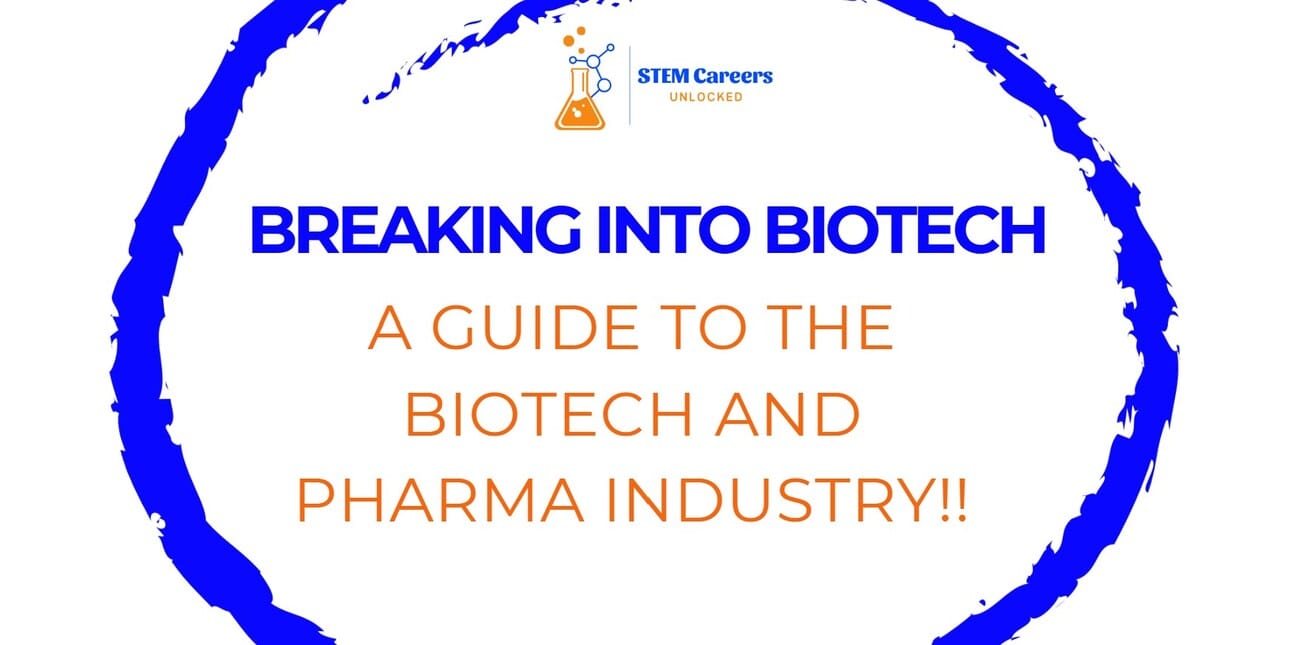
🧘♀️ Dirty Dancing Day! On August 22, 1987, Dirty Dancing hit theaters and instantly became a cultural classic. From the unforgettable lift to the iconic soundtrack, the film is all about stepping out of your comfort zone, finding confidence, and—of course—dancing like nobody’s watching.
So whether you’re heading into a new semester, meeting new friends, or just trying something outside your usual routine, today’s a reminder: the best moves often happen when you take a leap.
Today’s issue:
🔎Career Spotlight: Inside Look at Biotech's Cutting Edge Scientist...
💡Skills Spotlight: From mid-level to next-level: your 30-day plan
🔥Career Glow-Up Challenge: Level Up: One Skill, One Week Challenge!
🔥Professional Resources: Want to Share Your Expertise as a Guest Columnist?
💼Resource: Breaking into Biotech: A Guide to the Biotech & Pharma Industry

🔎STEM CAREER JOB OF THE WEEK
⚙️Inside Look at Biotech’s Cutting Edge Scientist…

Walk into a biotech cleanroom and you’ll find Manufacturing Associates at the heart of the action. They’re the ones taking breakthroughs from the lab bench and scaling them into real medicines—vaccines, antibodies, and even cutting-edge cell-based therapies.
Their day might start with prepping solutions and carefully measuring ingredients, then shift to running massive bioreactors where living cells grow. Every step is tracked, logged, and double-checked—because in biotech, precision isn’t optional, it’s the standard. Working under Good Manufacturing Practices (GMP), they make sure every condition is sterile and every detail is exact.
It’s a hands-on role that blends science and craftsmanship. And while patients may never see them, Manufacturing Associates are the quiet force helping turn scientific discoveries into life-saving treatments.
🎓Major:
- Biotechnology, Biology, Chemistry, Biochemistry, Chemical Engineering, or other related STEM fields.
- Education level: Usually a bachelor’s degree; some positions accept associate’s degrees or strong lab/manufacturing experience.
Job functions:
A Manufacturing Associate works on the frontline of drug production, ensuring medicines are made safely, consistently, and at high quality. Their role is hands-on and highly regulated. Some key responsibilities include:
⚙️Operating and monitoring bioreactors, filtration systems, and purification equipment.
Following batch records and SOPs (Standard Operating Procedures) to make products like vaccines, antibodies, or cell therapies.
Preparing solutions, buffers, and growth media.
Maintaining cleanroom and GMP compliance (sterile gowning, documentation, environmental monitoring).
Recording detailed data for regulatory compliance (FDA, EMA, etc.).
Supporting troubleshooting of equipment or processes.
Working with cross-functional teams (quality, engineering, development).
🧠Key Skills Needed:
- Technical: GMP knowledge, aseptic/sterile technique, familiarity with bioreactors, chromatography, or filtration systems.
- Soft Skills: Attention to detail, teamwork, time management, communication.
- Problem-Solving: Ability to follow procedures while recognizing and reporting deviations.
- Adaptability: Comfortable working in shifts or fast-paced environments.
💰Salary Landscape:
- The salary range varies depending on factors such as location, experience, and skill level.
- You can expect an annual salary ranging from $25,166 to $68,589, with an average of $42,774 per year in the United States. Source: Zip Recruiter)

Join over 4 million Americans who start their day with 1440 – your daily digest for unbiased, fact-centric news. From politics to sports, we cover it all by analyzing over 100 sources. Our concise, 5-minute read lands in your inbox each morning at no cost. Experience news without the noise; let 1440 help you make up your own mind. Sign up now and invite your friends and family to be part of the informed.

💡SKILLS SPOTLIGHT
From Mid-Level to Next-Level

💫💫 Mid-level is where many STEM pros stall—not for lack of skill, but for lack of visibility, scope, and narrative. Promotions are earned with consistent impact and made with clear business cases. This guide gives you a simple, repeatable plan to move from “solid performer” to “obvious next-level.”
The 30-Day Promotion Positioning Plan (STEM Edition)
Week 1 — Calibrate your target and evidence
🔸Decode “next level.” Skim 3–5 job descriptions for your target title. Circle recurring themes (scope, autonomy, impact).
🔸Translate to outcomes. List business outcomes that matter to your org (throughput, reliability, cost, quality, compliance, patient safety, cycle time).
🔸Baseline your impact. Pick 2–3 projects and write: Problem → Action (tools/tech) → Result (metric, timeframe, magnitude).
Week 2 — Expand scope & reduce drag
🔸Adopt a system. Own a metric, not just a task (e.g., “own on-time release for assay X”).
🔸Create leverage. Document once, teach twice, delegate thrice. Turn your know-how into a checklist/SoP/README others can use.
🔸Stakeholder map. Identify manager, skip-level, 2 cross-functional partners. Schedule short touchpoints to align on priorities.
Week 3 — Show your work (consistently)
🔸Demo cadence. Share a 1-pager every other week: goal, progress, risks, next moves.
🔸Speak in business terms. “Reduced run time 28%” → “Freed 6 hrs/wk per scientist, enabling 1 additional experiment per sprint.”
🔸Meeting presence. Aim to (a) clarify decisions, (b) pre-empt risks, or (c) unblock others—at least once per key meeting.
Week 4 — Make the case
🔸Brag doc → promotion brief. 1 page, 5 bullets max, each bullet = outcome with a metric.
🔸Ask with a timeline. In your 1:1: “Based on A/B/C, I’m operating at [Target Title] in scope and outcomes. What’s the path and realistic timeline to formalize this?”
🔸Agree on proof. Get explicit criteria and dates. Follow up with notes in writing.
Copy-and-Paste Templates
Impact bullet (swap in your details): Automated QC on [dataset/process] using [Python/LabVIEW/qPCR method], cutting cycle time 31% and saving $14K/quarter in reagents
Weekly update skeleton:
🔸Objective: what business goal you’re driving
🔸Progress: 1–2 concrete wins with numbers
🔸Risks/Needs: blockers + what you need
🔸Next: the two things you’ll deliver before next update
Promotion brief outline (1 page):
🔸Role today → role you’re operating at
🔸Top 3 outcomes (with metrics)
🔸Scope expansion (systems you own/created)
🔸Cross-functional impact (who benefited, how)
🔸What’s next (how you’ll multiply results)
This Week’s Challenge
🔸Draft your promotion brief (1 page, 5 bullets).
🔸Book a calibration 1:1 with your manager to review it and align on criteria + timeline.
🔸Hit reply with one of your impact bullets—I’ll help tighten it.

📅🔥CAREER GLOW-UP CHALLENGE:
Level Up: One Skill, One Week Challenge!

🔥 Goal: To strengthen your career by focusing on one specific, high-impact skill instead of spreading yourself thin across a broad area.
🔥 Why It Matters: Many early professionals say they want to “get better at leadership,” “learn marketing,” or “improve communication.” The problem? Those are too broad to make meaningful progress quickly.
When you choose one specific, targeted skill, you:
🟠 Build measurable expertise faster
🟠 Increase your confidence through quick wins
🟠 Stand out in job applications or performance reviews
🟠 Create a portfolio of real results you can point to
This is how you shift from being a general learner to being seen as someone who delivers tangible value
Outcome:
By the end of this challenge, you’ll:
✔️Identify and commit to one laser-focused skill
✔️Create a mini-learning plan around it
✔️Practice it in a way that shows visible results (something you can share in your Brag File, portfolio, or next performance review)
Day 1: Narrow It Down
Take a broad area and break it into specific skills. Example:
🟠Broad: Data Analysis
🟠Specific: Building pivot tables in Excel
🟠Broad: Communication
🟠Specific: Leading a 5-minute project update meeting
Pro tip: Ask yourself, “What small skill could I learn in 2–4 weeks that would have a noticeable impact?”.
Day 2: Define Your Why
Write down:
🟠Why this skill matters for your role, future career, or confidence.
🟠How it could make your work easier, faster, or more effective.
Example: “If I master Google Ads campaign optimization, I can directly improve lead generation for my team, which makes me more valuable.”
Day 3: Set a Micro-Goal
Create a goal that’s measurable and achievable:
🟠Instead of: “Get better at data visualization”
🟠Try: “Create one clear, engaging chart in Power BI to present next week’s project update.”
Day 4: Learn with Intention
Dedicate 20–30 minutes a day to targeted practice. Options:
🟠Watch one short tutorial
🟠Apply the skill in a small project at work
🟠Do a mini exercise (like writing 10 subject lines)
Day 5: Show Your Work
🟠Document your progress. Share it with your manager, mentor, or post about it on LinkedIn. This visibility turns your learning into career currency
Day 6: Reflect & Decide What’s Next
At the end of 2–4 weeks, ask:
🟠Did I gain a new confidence boost?
🟠Can I point to an example of applying this skill?
🟠Do I want to keep sharpening it, or pivot to a new one?
✨✨Motivational Reminder:
“Skills compound like interest—the more specific and focused you are, the faster your value grows.”

STEM Careers Unlocked guest expert articles provide industry thought leaders with an outlet to share their tips, views, and insights on emerging trends, challenges, technologies, and regulatory compliance.
Who can contribute for free? Subject matter experts who are:
✔️Employed at pharma, biotech, cell/gene therapy, or medical device companies developing their own pipeline of products (innovative or generic/biosimilar)
✔️Employed at consultancies or are independent consultants
✔️Employed at regulatory bodies
✔️Employed in academia
✔️Employed at or are active members of industry organizations or consortia (who would publish under that affiliation)
✔️Employed at market research firms

💼PROFESSIONAL DEVELOPMENT
Breaking into Biotech: A Guide to the Biotech & Pharma Industry!
💼Hey there—thinking about a career in biotech?
You’re in the right place. Whether you're deep into your STEM major or just starting to explore career options, this Breaking into Biotech Career Guide is here to help you figure out what the biotech world is all about—and how you can be a part of it.
Biotech is where science, innovation, and real-world impact come together. From cutting-edge research to creating life-saving therapies, there's a place for almost every interest and skill set. We’ll break down what the industry looks like, what kinds of jobs are out there, and what steps you can take now to get your foot in the door.
Let’s get into it!

What kind of professional development content would you like to see?






